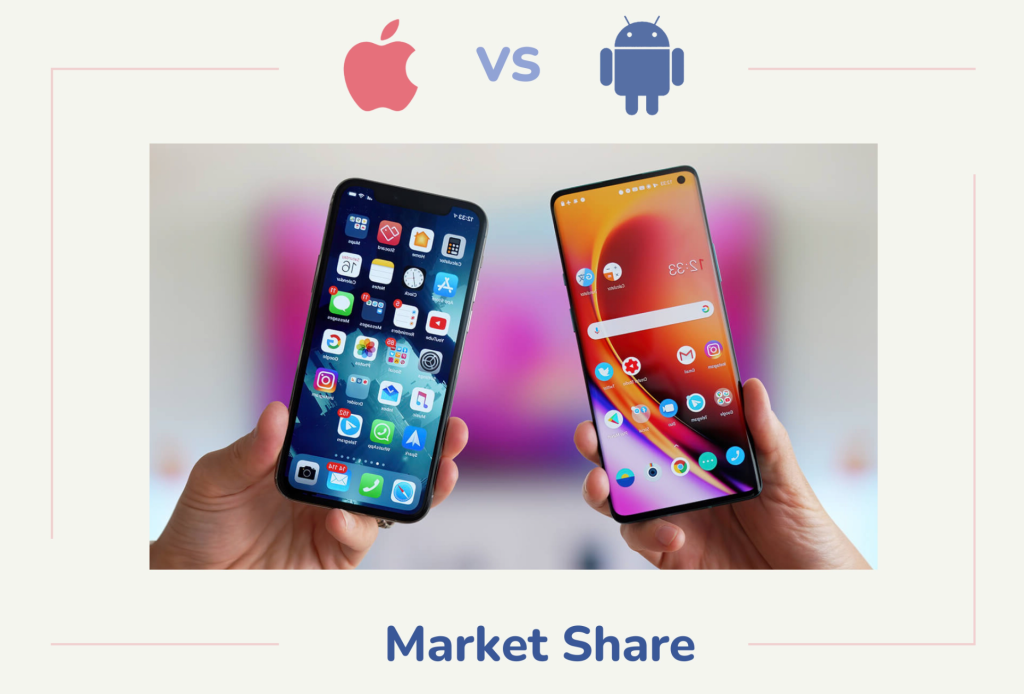iOs & Android – What to consider when scoping for Mobile App Development?
Building a mobile app is important because it provides a better customer experience, generates more sales, and allows you to become more competitive in the market. If you’re thinking of building an app, here are some of the factors that come into play.
Quick Links
Audience
Know your audience. Always think of the people who will download your app. What are the problems that your app will solve for them, and where are they coming from?
If your target audience lives mostly in the US, you’re better off with iOS since most of the people in this region use iPhones. Monetization comes from direct app purchases because users are more willing to pay for downloading apps and making in-app purchases.
If your target audience lives in Asia, Africa, Latin America, and some parts of Europe, then an Android app would be the better option. Although Android users greatly outnumber iOS users worldwide, they are less likely to pay for a mobile app. Monetization is mostly done through advertising.
In Australia a study by Statista showed in September 2020 that 53% of all mobile users were iOS, so a more even split to Android.
Check out this infographic comparing Android and iOS market share to see how Android controls the majority of the worldwide OS market, while iOS generates twice the revenue! Check out the most up-to-date and accurate iOS vs. Android market share statistics for 2022.

If your app will cater to a wider range of customers, then it is a smart strategy to develop a cross platform app instead of a native one so that it can be used in both platforms simultaneously, with maintenance being a lot easier also.
Features
The main driver of the app’s development cost is its features. Building an app with basic features would be a lot less complicated and less expensive compared to building a social networking app, an ecommerce app, or a gaming app from scratch.
Add-on services like push notifications, administrative dashboards, third party integrations, socials, chat/messaging, offline mode, data encryption, localization, and multi-language support will also drive up the cost of iphone app development. Melbourne business owners who are planning to build a simple app can expect the development to finish in two weeks to three months. The more complex apps, on the other hand, may require six months or more for quality development.
If budget is a problem, you can simply start with the minimum viable product and then go from there. Save the bells and whistles for the later stages of app development, when you have more funds to dedicate to your project.
Coding Language
Android relies on Java, while iOS uses Apple’s own native programming language called Swift. Note that Swift is built to answer to the needs of iOS developers, which cuts down the time spent on coding and reduces labor costs.
iOS is also perceived as the more secure system between the two. Since Android is built on an open-source platform, its apps might be more susceptible to cyberattacks than its more closed-off iOS counterpart.
Testing & Publishing
Google Play is more accessible than Apple’s App Store. As long as your mobile app follows Google Play’s guidelines, it’s highly likely to be approved in the store. On the other hand, the App Store is more selective, and its strict guidelines usually translate to better quality apps.
Testing is an important stage because it determines the quality of the app. During testing, you need to ensure that the users experience minimal lags or glitches. Both the iOS and Android platforms provide free documentation so you can determine how the app performs real-time.
During the deployment stage, you only have to make a one-time payment of $25 to make your app public on Google Play, which is a lot cheaper compared to the yearly $99 fee Apple requires.
Developer
If you don’t know how to code, then you will have to hire a developer to build the app for you. You can either go with 1) a freelancer or 2) an app development company.
Hiring freelance app developers in Melbourne would be cheaper at first glance; however, this option may turn out to be more expensive in the long run. The freelance developer you hire may be working for multiple clients and might not be able to dedicate as much time and attention to your project as it needs.
On the other hand, a mobile app development company will charge more than a freelancer. They already have the experience and proven track record of building apps.
The adage “you get what you pay for” applies here. If you choose the cheaper route, the end result might not be to your liking and you’ll have to find another developer.
You also need to choose between hiring an in-house developer or outsourcing the development work to an agency like The App Team. Hiring your own team may take a while because you’ll either hire someone who can play multiple roles, or hire designers, programmers, and testers separately.
On the other hand, working with an agency gives you access to a multidisciplinary team. You’ll interact with a project manager and be able to get the skills of a developer, UX/UI designer, illustrator, and copywriter all under one roof.
Post-Development
Mobile app development is an ongoing process, and it never stops even after you have successfully launched your app.
Consumer and market trends are always evolving, and your app must be able to address these changes to remain competitive. There will always be bugs that need to be fixed, and updates to be made in an Android app development. Melbourne businesses should expect 10-20% of their development costs to be spent on ongoing tech support after the app launch.
Final Thoughts
A mobile app is a great way to help your business gain more traction and more customers. But as you can see, determining the cost of a mobile app is not something that can be done without careful consideration, since a lot of factors come into play.
Making the decision to use iOS, Android, or both should not be taken lightly. In terms of cost, there is no significant price discrepancy between the two app stores. The main difference is that Android apps may take longer to develop considering the variety of Android devices and screen sizes to consider.
However, each platform comes with its own pros and cons, and you should consider them before making an informed decision. As a general rule of thumb, you should be choosing the platform that your target customers use. If you want to gain a wider range of audience, consider making the app accessible on both platforms.
How to Use AI-Powered SEO Tools for WordPress eCommerce
SEO is a critical factor in the success of any e-commerce WordPress store. As competition…
0 Comments11 Minutes
Why Short-Form Videos Are the Future of Content Marketing
Your Instagram customers spend over 50% of their time watching short-form videos and reels. Rather…
0 Comments12 Minutes
The Role of Digital Marketing in Business Growth
Online marketing touches every aspect of a business, whether it is initiating the idea or for an…
0 Comments3 Minutes
AI Meets Authenticity: Balancing Automation and Human Touch in Content Marketing
Is your brand starting to sound like a robot? In a world where algorithms write faster than any…
0 Comments8 Minutes
Essential Tools for Enhancing Web Design and UX Hosting
Have you ever visited a website that felt slow, clunky, or confusing? A website that is poorly…
0 Comments11 Minutes
How a Mini Cart Transformed My Store’s Shopping Experience
Okay, real talk—running an online store is hard. You think you’ve got everything figured out, you…
0 Comments9 Minutes
Balancing Your Security Initiatives With Industry Compliance Requirements
Managing a business today comes with a number of daily battles that need to be fought. Resources…
0 Comments11 Minutes
Best plugins to enhance the customer shopping experience
Customer experience is a key part of every online store. A good experience helps customers find…
0 Comments7 Minutes








